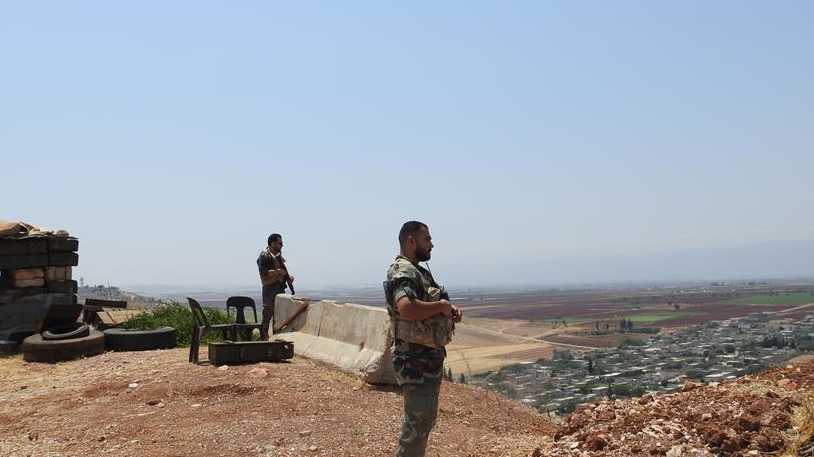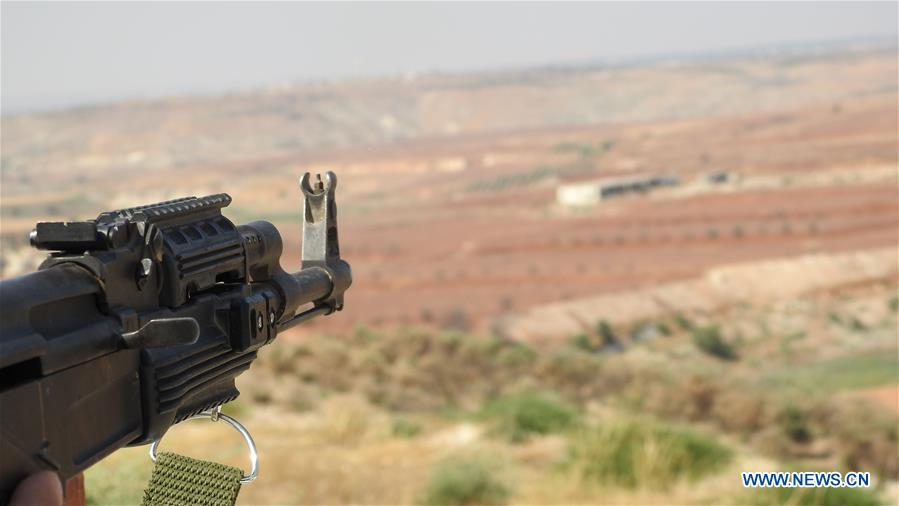
Syrian military personnel observe the situation in the northern countryside of the central province of Hama, Syria, August, 2, 2019. /Xinhua
Syrian military personnel observe the situation in the northern countryside of the central province of Hama, Syria, August, 2, 2019. /Xinhua
Editor's note: Hannan Hussain is a security analyst at the London School of Economics – South Asia Center, and an author. The article reflects the author's opinions, not necessarily the views of CGTN.
The Idlib truce brokered between Russia and Turkey hangs in a delicate balance. Syrian forces managed to make tactical advances towards the villages of Al Burayi and Ma'arat Muqas, while periodic clashes between hardline jihadists and rival forces continue to take their course.
President Erdogan flew to Brussels, urging NATO's support in a critical refugee crisis. His 10-point list suggests everything is on the cards: surveillance drones, reconnaissance aircraft, and border assistance. This isn't what lasting peace looks like.
Though the ceasefire has limited the magnitude of the conflict, there is considerable ambiguity over what constitutes an actual violation of truce.
Moreover, the two dynamics that led both sides to contemplate a ceasefire in the first place – Moscow's assistance to President Bashar Al Assad's offensives and Ankara's support for opposition groups – remain very much in tact. To desire a peaceful outcome without any change in posture, is a tough bet.
Begin with Ankara. Erdogan's view that it can manage rebel groups in Idlib, and simultaneously secure the region as a buffer to Syrian advances, is highly ambitious.
Part of securing the rebel stronghold is to ensure that Syrian democratic forces do not proceed with further offensives. This possibility is directly jeopardized by the sustained presence of key rebel groups, including the Al-Qaeda affiliated Hayat Tahrir al-Sham.
Moreover, Moscow's position on Ankara's counter-offensives has steered towards greater discontent, especially as Turkish armed forces cede greater vacuum to anti-Assad militias. "The actions of the militants were supported by artillery fire from the Turkish armed forces, which allowed the terrorists to break through the defense of the Syrian army," said the Russian Defense Ministry after a brief clash on February 20.
A week later, the deadly airstrikes that killed 36 Turkish soldiers and drove Moscow-Ankara ties to a tipping point, came with the same justification from the Russian Defense Ministry: "Turkish soldiers who were in the battle formations of terrorist groups came under the fire of Syrian troops."
Ankara's reluctance to divorce its military goals from the broader jihadist power-play in Idlib doesn't just limit Russia's willingness to apply diplomatic leverage on Damascus. It weakens Turkey's rationale to secure the last rebel-controlled stronghold in Syria, and induce greater demand for a de-militarized zone, as sought in 2018.

A gun in standby position aiming at rebels in the northern countryside of the central province of Hama, Syria, August, 2, 2019. /Xinhua
A gun in standby position aiming at rebels in the northern countryside of the central province of Hama, Syria, August, 2, 2019. /Xinhua
Without a change in alignment during the ceasefire, Moscow feels more inclined to throw its weight behind Assad – who views anti-Syrian militias in Idlib as an impediment to the survival of his government, which is central to Moscow's Middle East pivot.
Conflicting narratives on stability mark another fragility in the truce. First, Assad is inclined to fight tooth and nail to boast his control over the whole of Syria, and has shown every possible sign to tighten his grip on Idlib, even if it arrived at the cost of Turkish collateral.
From Ankara's viewpoint, another advance from the Syrian forces would threaten the stability of Turkey's southern end. It could deal a blow to the seemingly favorable status-quo in Idlib, underpinned by Ankara-aligned rebel factions, who staked their claim in 2015 with no intention of giving back.
Greater gains for Syrian democratic forces would also mark a win for Syrian Kurds, who could whip up fears of Kurdish separatism within Turkey. For Erdogan to accomplish any of these objectives, Syrian forces must withdraw in full. That puts the spotlight on Moscow.
Moscow's rapport with Ankara, and its deep-seated support for Assad, gives it proportional leverage over both parties. But in terms of stabilizing Idlib, it considers Assad's territorial control as a matter of entitlement. Moscow has reinforced this position in the three-point ceasefire agreement, by not guaranteeing to any withdrawal of Syrian government forces – Ankara's stated objective.
Alternatively, Putin has confined Erdogan to the short-term guarantees of a security corridor and joint Russian-Turkish patrols – an arrangement which the Turkish President argues is far from "concrete."
Renewed outreach to NATO is less likely to make the ceasefire stick. On Monday, Erdogan urged the North Atlantic Alliance to show its support for the tens of thousands of displaced refugees at the Turkish-Greece border.
"The crisis stemming from Syria, with its security and humanitarian aspects, is threatening our region and even all of Europe," Erdogan said after arriving for talks with the EU and NATO. "No European country has the luxury to remain indifferent.”
It is a pessimistic estimate for NATO to follow through without U.S. approval, considering the fact that Washington has just rejected the truce as "premature" at the UN Security Council this month. Moreover, Washington's key NATO allies – including Germany – have raised questions about the durability of the truce. Instead, they are willing to observe whether safe zones for the displaced would actually materialize.
Nothing within the negotiated ceasefire agreement guarantees these safe zones.
In addition, Ankara's migration call to the West cements its single-handed ownership of Idlib's humanitarian crisis – enabling Moscow to maintain a low-key profile, while Damascus strengthens its grip over territories already captured.
Hence, a cessation of hostilities does little to prevent these divergent dynamics from taking their own course. It is Idlib that remains caught in the crossfires.
(If you want to contribute and have specific expertise, please contact us at opinions@cgtn.com.)